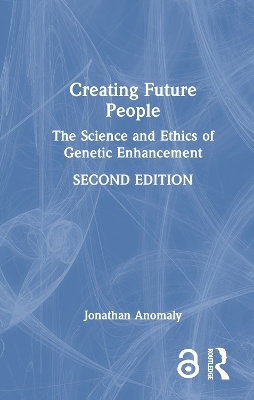
Creating Future People
The Science and Ethics of Genetic Enhancement
Seiten
2024
|
2nd edition
Routledge (Verlag)
978-1-032-73451-4 (ISBN)
Routledge (Verlag)
978-1-032-73451-4 (ISBN)
Creating Future People offers readers a fast-paced primer on how advances in genetics will enable parents to influence the traits of their children, including their children’s intelligence, moral capacities, physical appearance, and immune system. It explains the science of gene editing and embryo selection and motivates the moral questions it raises by thinking about the strategic aspects of parental choice. Professor Anomaly takes seriously the diversity of preferences parents have, and the limits policymakers face in regulating what will soon be a global market for reproductive technology. Anomaly argues that once embryo selection for complex traits happens it will change the moral landscape by altering the incentives each person faces. All of us will take an interest in the traits everyone else selects, and this will present coordination problems that previous writers on genetic enhancement have failed to consider. Anomaly ends by considering how genetic engineering will transform humanity.
Key Updates to the Second Edition
Significant revisions to include more details about what will be scientifically possible in the coming years and the moral issues these developments will raise.
New and substantial coverage of embryo selection (guided by polygenic scores) for minimizing the risk of genetic diseases.
Engagement with all important, new publications on the science of genetic enhancement
Key Updates to the Second Edition
Significant revisions to include more details about what will be scientifically possible in the coming years and the moral issues these developments will raise.
New and substantial coverage of embryo selection (guided by polygenic scores) for minimizing the risk of genetic diseases.
Engagement with all important, new publications on the science of genetic enhancement
Jonathan Anomaly wrote Creating Future People while he was a visiting professor at the Uehiro Centre for Practical Ethics, Oxford University. He is currently the academic director of the Center for Philosophy, Politics, and Economics in Quito, Ecuador, and works with a company that offers polygenic embryo screening for physical and mental traits. Prior to this, Anomaly taught at Duke University, UNC Chapel Hill, and the University of Pennsylvania.
Preface; Acknowledgements; 1. Smart People; 2. Good People; 3. Pretty People; 4. Healthy People; 5. Synthetic People; Conclusion; Appendix A The Ultimatum Game; Appendix B The Prisoner’s Dilemma; Appendix C The Public Goods Game; References; Glossary; Index.
| Erscheinungsdatum | 18.04.2024 |
|---|---|
| Zusatzinfo | 2 Halftones, black and white; 2 Illustrations, black and white |
| Verlagsort | London |
| Sprache | englisch |
| Maße | 129 x 198 mm |
| Gewicht | 480 g |
| Themenwelt | Geisteswissenschaften ► Philosophie ► Ethik |
| Geisteswissenschaften ► Psychologie ► Allgemeine Psychologie | |
| Geisteswissenschaften ► Psychologie ► Entwicklungspsychologie | |
| Geisteswissenschaften ► Religion / Theologie | |
| Naturwissenschaften ► Biologie | |
| Sozialwissenschaften ► Soziologie | |
| ISBN-10 | 1-032-73451-5 / 1032734515 |
| ISBN-13 | 978-1-032-73451-4 / 9781032734514 |
| Zustand | Neuware |
| Informationen gemäß Produktsicherheitsverordnung (GPSR) | |
| Haben Sie eine Frage zum Produkt? |
Mehr entdecken
aus dem Bereich
aus dem Bereich


